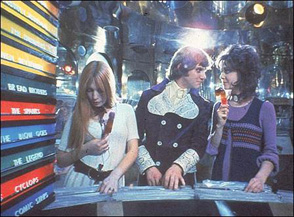Viking Night: A Clockwork Orange
By Bruce Hall
June 21, 2011
Part of what gives art beauty is subjectivity. You say tomato, I say potato. You call something a revolting glorification of sex and violence. I call it a witty, scathing satire of social hypocrisy. Stanley Kubrick called it A Clockwork Orange. The controversial director based his controversial movie on the equally controversial novel, making enough changes to create still more debate. This is one of the most notorious films of all time; one that people have strong opinions on even if they’ve never seen it. Kubrick’s bombastic interpretation led to widespread misinterpretation, but there’s more to understanding this movie than just its disturbing imagery. Despite some significant flaws and the occasional deviation from its source material, the message behind the story is pretty sound. A Clockwork Orange turns an unflinching eye on two of civilized society’s greatest fears - violent crime, and the degree to which it’s worth sacrificing personal liberty to deal with it.
The story is narrated by Alex Delarge (Malcom McDowell in a defining role), a troubled teen living in a near future dystopian England. Alex skips school during the day and usually spends the night hanging out with three of his ignorant, bloodthirsty friends. Let me clarify - Alex is a straight up sociopath. He’s glib, charming, manipulative, cunning, sadistic and completely lacking in the ability to feel pity or remorse. So for fun, Alex and these friends of his get high on drugs and roam the streets looking for people to beat and rob. At home, Alex is a latchkey kid with tragically permissive parents. His dimwitted mother works long hours and is strung out on sleeping pills. His father is suspicious of the boy, but far too timid to confront him. The only adult in Alex’s life who makes an effort is his parole officer, Mr. Deltoid. But Deltoid is a malignant windbag, and Alex sees him as more a curiosity than an authority figure.
So there’s nobody to stop Alex and his crew from stomping beggars and getting into chain swinging brawls with rival gangs. These hoodlums have the run of the city after dark and the crime wave has Britain's government on the ropes with voters. It gets worse after Alex and his entourage brutally assault a famous writer and his wife. The public wants justice, and this will soon impact Alex because his rowdy friends are getting tired of him. Even this bunch of jackasses can see their leader is just a cocky, self absorbed punk. They devise a plan to depose him, and it goes even better than they’d planned. Another home invasion goes awry and Alex accidentally kills an elderly woman. His partners turn on him and leave him behind for the police, who gladly give him a place to live for the next 14 years.
Inside, the cunning lad quickly learns how to play the system. He acts the part of a model prisoner. He starts reading the Bible - because he gets off on the violence in the Old Testament - and convinces the Chaplain to recommend him for an experimental rehabilitation program. In exchange for letting the State “cure” his violent tendencies, Alex will be released 12 years early. Certain he’s got everybody fooled, the boy accepts the offer. He’s not so smug when he discovers that the “treatment” involves pumping him full of drugs and forcing him to watch incredibly graphic films until he becomes physically ill.
Continued:
1
2
3
|
|
|
|




